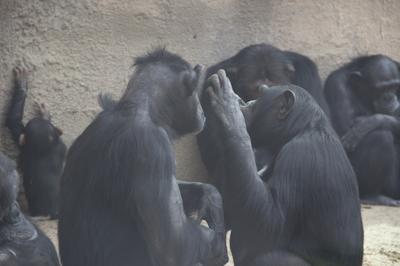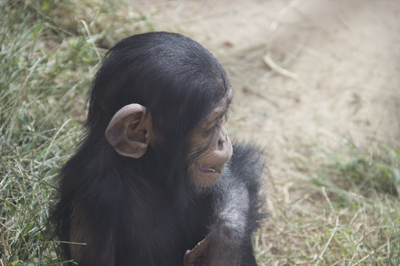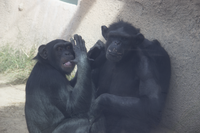From Lab to Fab
The early days
When Alf first came to the ABQ BioPark Zoo, he was wary of humans and had never touched grass.
Today things are a lot different—he’s the leader of a thriving chimpanzee troupe alongside alpha female Elaine.
Alf and Elaine, together with eight other chimps, came to the BioPark 13 years ago from The Coulston Foundation (TCF), a testing laboratory in Alamogordo that closed its doors in 2002.*
TCF opened in 1993; a brainchild of toxicologist Fred Coulston, the facility may have had up to 650 chimpanzees at one point. The lab used chimpanzees to conduct research on AIDS, Hepatitis C and other diseases.
The BioPark’s chimps were naïve, meaning they were not given any live vaccinations—TCF primarily used them as breeding stock. Although they were not infected with live diseases at TCF, they were routinely sedated and likely received vaccines for testing purposes.
“Who’s to say what these chimps have really gone through,” Senior Zookeeper Greg Browder said. “Most of them spent a fair amount of time in the lab.”
The BioPark acquired the chimpanzees after approaching TCF, which was winding down its operations at the time. When the chimps arrived to the BioPark, they carried a bit of baggage, most notably a distrust of humans.
 A new life
A new life
In the beginning, the chimps were out of their element at the BioPark. In addition to being in a new and unknown place, they were temporarily housed next to gorillas, which made them uneasy.
“They didn’t know where they were and what would happen to them next,” Zoo Manager Lynn Tupa said. “I’m sure it was very scary and intimidating to them.”
At TCF, the chimps regularly received medications in their food. This left a lasting impression on some of the chimps, even after being relocated to the zoo. For example, Alf only accepted whole foods at first. According to Tupa, he was apprehensive about “half” foods—he suspected they had medications stuck inside. (A “half” food is normal food cut in half or half of the animal’s diet for the day split in half. Either way, the chimps were suspicious of these foods because half foods typically concealed medications at the lab.)
But the chimps’ anxiety would not last forever—BioPark staff habituated the chimps to non-threatening human contact daily.
“In every interaction between an animal and human, the animals learn something,” Tupa said. “Are we someone to be afraid of? Are we going to hurt them? Are we going to give them a treat or enrichment? Are we going to yell at them? Are we going to interact positively with them?”
She said the chimps swiftly learned that their lives were going to be greatly different now that they lived at the BioPark.
“Once they got used to us and trusted us, I think they adjusted quickly,” Tupa said.
And once introduced to their new zoo habitat they got to enjoy one more new experience: the sensation of grass on their toes. As lab chimps, they were confined to cement cages—although they had previously ventured outside, they had never experienced a lawn.
“When the door opened and they got to see grass, they were like, ‘whoa,” Tupa said of the first time the chimpanzees entered their new habitat at the zoo. “It was nice to see them go out there and get to explore and climb.”
A bright future
 Today the group is flourishing and growing. In fact, the group’s two newest members—twins Dezi and Rio—turn a year old November 4.
Today the group is flourishing and growing. In fact, the group’s two newest members—twins Dezi and Rio—turn a year old November 4.
Dezi and Rio have unique personalities, as do all of the other chimps. According to Browder, Dezi is the reactionary, emotional one and Rio is the introspective, observant type.
Browder said the twins’ birth initiated new group dynamics—almost overnight, their big sister Kianga morphed from “spoiled princess” to proud member of Dezi and Rio’s protection crew. Browder also said the group is more sensitive to outside disturbances with the little ones around.
Dezi and Rio are Elaine and Alf’s offspring, and thus receive the royal treatment. Although there is a clear hierarchy among the chimps—Alf and Elaine sit at the top, and individuals like Babette are at the bottom—each group member has an important role and they all share a special bond. This kinship is evidenced by cooperative grooming, a staple behavior of a balanced chimp society.
“Grooming is the chimp hug—it’s like getting a manicure from your best friend,” Browder said. “When you get groomed, you’re in.”
* TCF lost most of its government contracts by 2001 because of concerns over the welfare of the animals. In 2002 it was purchased by Save the Chimps, which ceased all research and retired the animals. The surviving 266 chimpanzees still owned by TCF were transferred to Florida.
Story: Tina Deines


